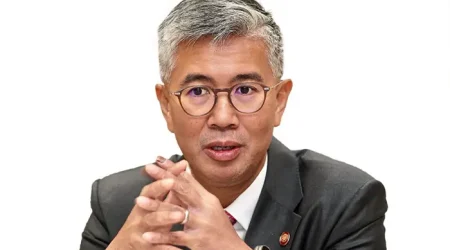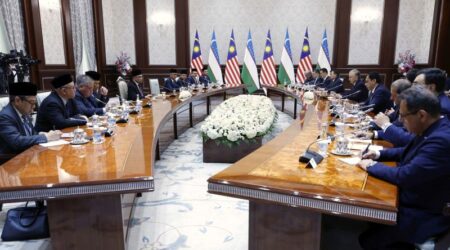Masidi slams Sabah Opposition, says state’s sukuk fund not another 1MDB
KOTA KINABALU: The Sabah government rejects Opposition claims that the RM900mil sukuk funds raised by state-owned SMJ Energy Sdn Bhd (SMJE) had the hallmarks of another 1MDB scandal, says Datuk Seri Masidi Manjun.
Taking on the Opposition, including Parti Warisan president Datuk Seri Mohd Shafie Apdal, the state Finance Minister said the Opposition and individuals spreading such claims online should stop making such “reckless” statements.
“Such baseless allegations and spreading disinformation will have consequences,” he said in a statement amid questions over the move by the state government to raise sukuk funds to pay off the debts of a state government-linked company.
Reiterating the rationale of the state government’s move to raise the sukuk funds, Masidi said it was to allow SMJE to acquire the state-owned Sabah International Petroleum Sdn Bhd (SIP) while also “restructuring and refinancing” its loans with the government-linked Sabah Development Bank Bhd (SD Bank).
He said the acquisition of SIP by SMJE and the restructuring of SIP’s debts through a RM900mil sukuk issuance would increase the value of its investments.
Among the benefits was that SIP would save over RM60mil per year in interest as the sukuk interest is much lower than the interest payable to SD Bank.
At the same time, SD Bank’s outstanding bond was now reduced by RM700mil with SIP’s payment of its loans and the bank can now continue its core operations as a development bank to fund projects in the focus areas of electricity, water and infrastructure.
Masidi also said that the restructuring saw SMJE receive RM397mil through SIP’s 10% ownership of PETRONAS LNG9 Sdn Bhd (PLNG9).
“The 10% ownership of PLNG9 (now transferred from SIP to SMJE) will continue to generate an estimated revenue of RM150mil per year for the next 13 years for SMJE,” he said, adding that SIP’s other operations and assets, including its off-shore services and assets have generated RM271mil in revenue for SMJE since the acquisition.
Masidi said the benefits of the state’s restructure of the three state owned companies were explained in the November 2023 Sabah assembly sitting as well as by the state Finance Ministry permanent secretary in May this year.
He said apart from paying off SIP’s loan with SD Bank, the remaining RM200mil of the Sukuk funds were used to redeem SIP’s outstanding loan with CIMB Bank Bhd.
He said that the proceeds of the Sukuk issuance that was received by SD Bank amounting to RM700mil were wholly utilised to pay back SD Bank’s bondholders.
“The success of this administrative effort resolved SIP’s historical issues, provided substantial savings on interest costs. This therefore contributes positively to Sabah’s overall development goals.
“This entire exercise is a value-accretive acquisition and is not a bail-out,” he added.
Masidi stressed that the Sukuk Wakalah programme was subject to a strict utilisation of proceeds rules which include financing capital expenditure, covering costs related to energy-related businesses, refinancing existing and future Islamic financings and defraying associated expenses.
The sukuk proceeds were used to refinance SIP’s existing borrowings with SDB which is in compliance with the Sukuk Wakalah programme and adheres to syariah-compliant principles approved by the Securities Commission Malaysia as part of the corporate restructuring exercise.
He said Shafie as a former chief minister and finance minister should know that for Sukuk Wakalah to be issued, there must be a clear and defined condition for how the funds will be utilised.
“Investors were extremely confident with this issuance which led to SMJE’s Sukuk Wakalah programme being over-subscribed by 3.9 times, thus enabling SMJE to obtain very competitive interest rates from the capital market,” he added.
Sabah’s inaugural sukuk had been recognised as the best non-IPO fund raising deal of 2023 while RAM, a credible rating agency in Malaysia, has assigned a AAA rating for the Sukuk Wakalah programme.













Leave a Reply